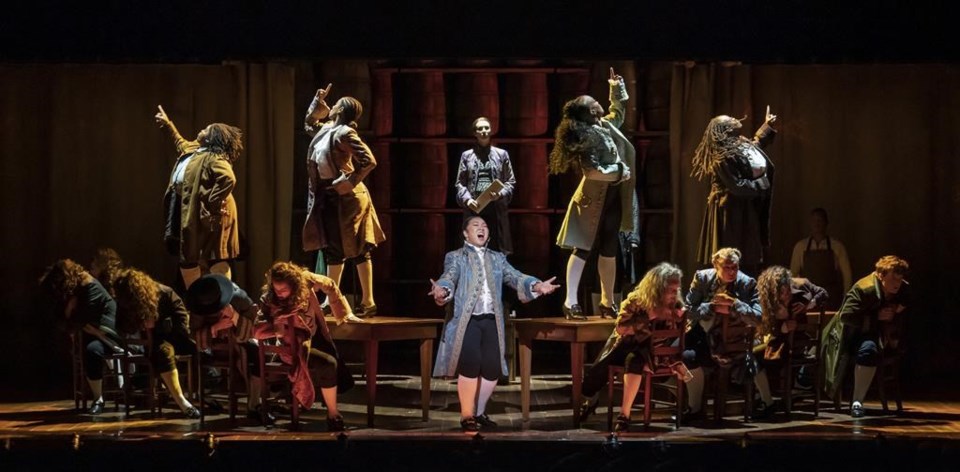NEW YORK (AP) — The somewhat antiquated musical “1776” has long been ripe for a radical makeover and it has found one on Broadway. “Someone oughta open up a window!” an actor cries in the first scene and that applies to both the stifling heat of the setting as well as this revival, which brings fresh air to a five-decade old show.
A company of multiracial, multiethnic performers identifying as female, trans and non-binary have taken over all the roles in the Roundabout Theatre Company show that opened Thursday without altering Peter Stone’s script, creating little pockets of new meaning the writer never could have seen. (“We’re men — no more, no less — trying to get a nation started,” says one actor.)
If the heroic Founding Father in a big musical not far away is Alexander Hamilton, here in the American Airlines Theatre it is John Adams, who in the stiflingly hot summer of 1776 is hoping to persuade the Continental Congress in Philadelphia to vote for the country’s freedom.
Unlike "Hamilton," “1776” addresses head-on the single most contentious subject in writing the Declaration of Independence — slavery. Adams, Thomas Jefferson and Benjamin Franklin want it abolished but the Southern delegates strenuously object. It is a powerful thing listening to a Black woman decry bondage.
Crystal Lucas-Perry plays Adams like a bull in a china shop, a hectoring, impatient Adams who admits he's “obnoxious and disliked.” But everywhere are scene-stealers — Eryn LeCroy with a mesmerizing “He Plays the Violin,” both Shawna Hamic and Gisela Adisa for their comedic timing and voices, and Carolee Carmello, here as close to a piece's villain (other than George III, of course) who is deliciously menacing. Then there's Elizabeth A. Davis, playing a taciturn Jefferson perfectly, not to mention a mean violin — all while pregnant.
Show highlights include the Carmello-led “Cool, Considerate Men,” the right-wingers' regimented dance about never compromising — where have we heard that recently? — and Sara Porkalob’s devilish “Molasses to Rum,” a chilling indictment of Northern hypocrisy.
Directors Jeffrey L. Page and Diane Paulus have their cast leaping on tables and hurrying across the big stage, trying to add energy to what is basically a musical about a roomful of aristocrats pontificating. They make Sherman Edwards’ hit-or-miss music and lyrics — he rhymes mania with Pennsylvania and predicate with Connecticut — shine as best they can.
There is an oblique message with the casting that had women actually been in charge back then, they probably would have gotten the job done with less fuss and fewer theatrics. Jefferson also has an awkward wordless exchange when a servant seems unimpressed by his line “We hold these truths to be self evident, that all men are created equal.”
The most uncomfortable bit is when the Black actors are tasked with recreating slaves at auction, a jarring step that could have been done more artfully.
Scott Pask's set is sadly underwhelming, using mostly barrels and four wooden tables. But most egregious of all is the use of two curtains — one behind and one in front — that are pulled across the stage on a rod somewhat jerkily by the actors, making the production seem amateurish, as if it is taking place in a massive shower stall.
The curtains are used for projections — images of protesters, war and a $2 bill — and to hide scene changes, but it is clumsy and there are slits that crack open every so often despite magnetic closing mechanisms that loudly click. These flimsy cloth pieces give way to a big, powerful set reveal at the end, but one wonders if it has been worth it.
Otherwise, it is a very worthwhile show, a foot in the past and another in the future. A second show exploring the origins of America's democracy with non-traditional casting is a welcome addition, especially now.
___
Mark Kennedy is at http://twitter.com/KennedyTwits
Mark Kennedy, The Associated Press




